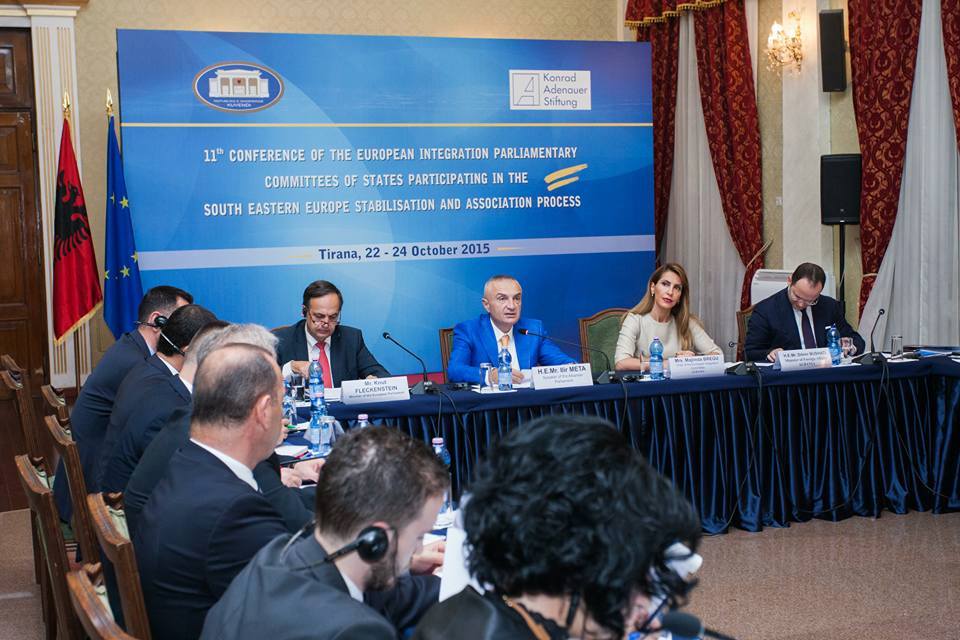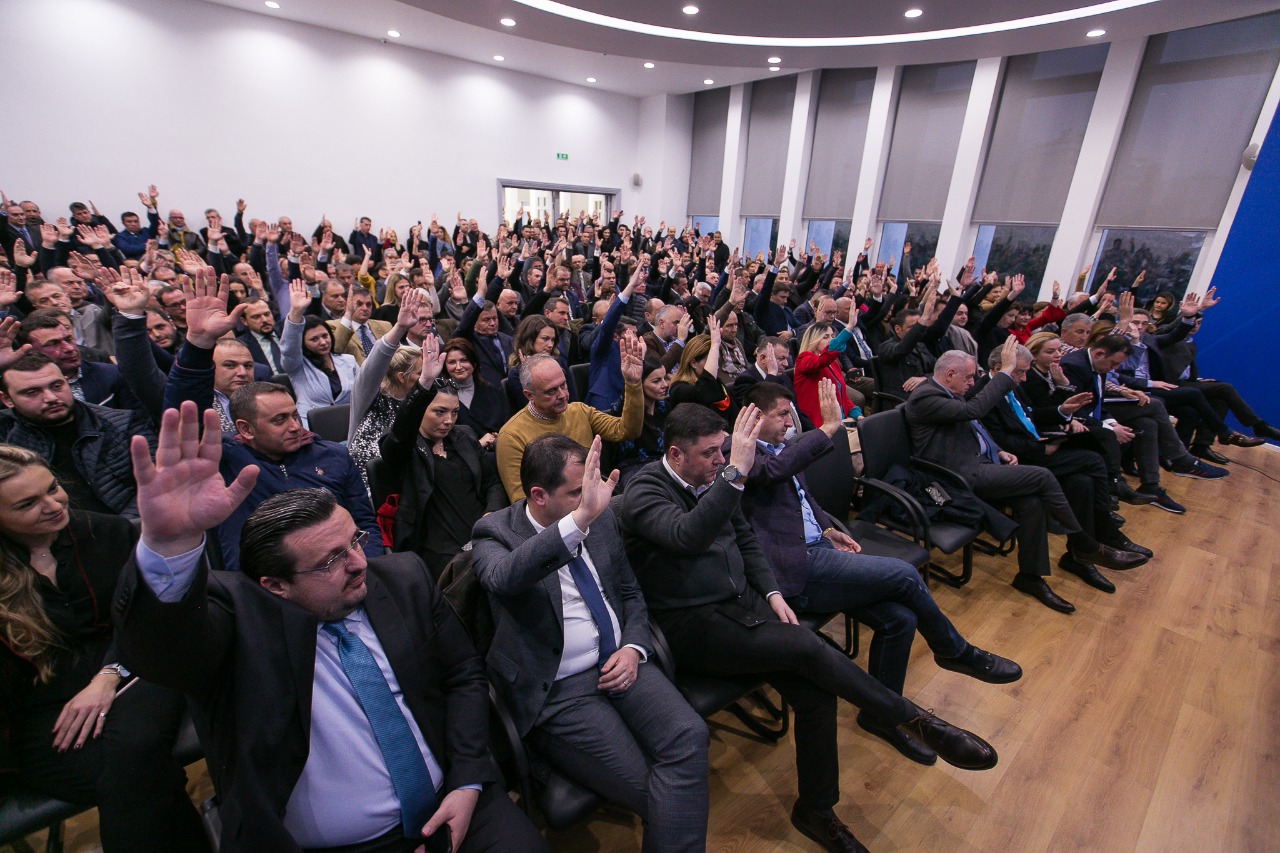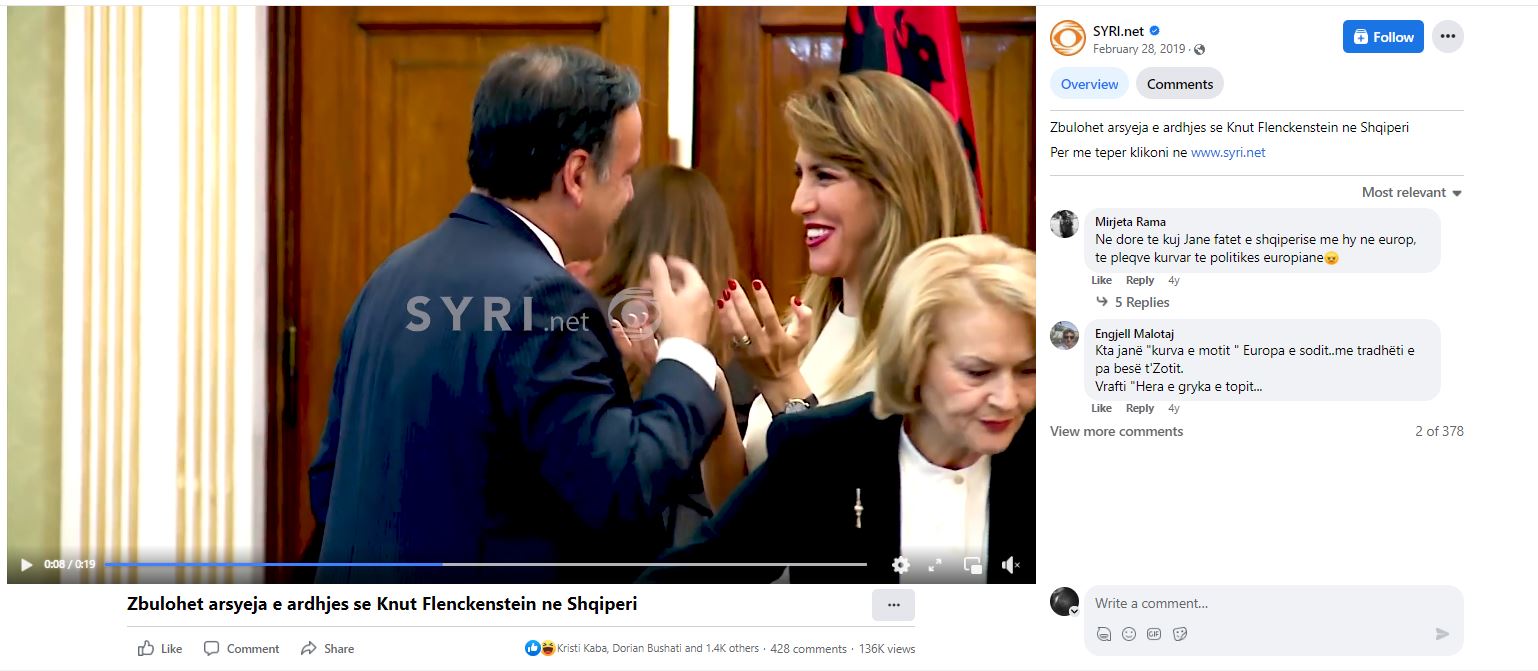In 2019, a 19-second video featuring a female politician caused a wave of misinformation and discrimination so intense that no one realized the footage was from 4 years prior, and that the politician was not even in Albania when the media raised claims about her. Four years later, Faktoje brings evidence of the results that such orchestrated disinformation campaigns have had on women who want to experience politics in Albania.
Jona Plumbi
Sitting in a well-known cafe bar in Tirana, while talking to Rudina Hajdari, a young former member of the parliament, the conversation starts by looking back in time.
“If before [in communism time] you had a dangerous opponent and they eliminated you physically, today they eliminate you through coordinated media disinformation.” – said Rudina, the daughter of Azem Hajdari, the publicly proclaimed hero of the 1990 student protests that sparked the end of communism in Albania.
Rudina is a young politician – or better said, was a politician – until she decided not to obey the party leader of the Democratic Party in his extreme decision to give up her parliamentary mandate en-block with all her deputy colleagues. The result was a coordinated disinformation campaign and public scrutiny of the personal life.
“There are so many of them [fake news] and they are so widely distributed that even those who invent them believe those lies.” – she said, stressing that today the motivation and the drive needed for young women to be involved in politics equals zero.
Slightly more optimistic on the matter as a self-professed idealist is Elona Gjebrea, a former politician who served 4 years as a member of parliament and 4 other years as deputy minister of Interior for the Socialist Party.
Although her political career was ‘tainted’ at times by disinformation campaigns, she works tirelessly to encourage young girls to become involved in politics in order to, as she puts it, “break the machismo that dominates it”.
Orchestrated Media Disinformation
After the clash between her principles and the decision of the party leader and the prevalence of the former, Rudina Hajdari explains how her political life turned. From being “the young politician descendent of a hero of Albanian democracy”, in no time she began being portrayed as “being bought by the political opponent, descendants of communism”.
“The narrative that began being spread immediately after I refused to give up my parliamentary mandate was that I was bought by Rama [head of the socialistic party] and the media was coordinated and journalists were incentivized to sell this narrative. The attacks came from several sides. The political attack, that is, I was bought by Rama. The family attack according to which I held the seat of a member of parliament to save my mother from a process of re-evaluation (vetting) in the justice system. And the last one was my personal life where the media was concerned with whether I had separated from my husband or not.” – Hajdari explains.
Former-minister of Interior Affairs, Elona Gjebrea also identifies the problem in the Albanian citizens’ lack of media literacy, as well as in the role that the media plays in Albanian society.
“Unlike other countries, Albanians are really affected by the news in the media. They trust them easily and therefore the role of the media is very important. I myself have been the subject of disinformation in the news and it is very difficult to refute news that has spread already. A suggestion that was given to me when I asked for an opinion was: Don’t bother with the media because they will only go after you even more. Personally I do not think that this is helpful.”
One easily verifiable disinformation that can easily portray orchestrated campaigns against women in politics, is the one concerning a 19-second video, posted 4 years after being recorded and yet spreading like a virus in the media.
In 2015, the National Council for European Integration of the Albanian Parliament was led by a woman, Majlinda Bregu. At that time, a member of the Democratic Party, she chaired the parliamentary forum for European integration.
On October 23, 2015, the parliament held the 11th Conference of Parliamentary Committees on European Integration of Participating States in the South-East European Stabilization and Association Process was held in the Parliament Presidency.

*Image of the conference held on October 22-24, 2015
At the time the conference was reported on the media regarding current topics of the time, such as ongoing justice reform discussions or Albanian asylum seekers around the world. Despite everything, today it is very difficult to find articles or news about the content of this meeting. But what is readily available on the internet are videos, images, and articles from online media that misinform about the timing and purpose of this meeting.

*Google search results for the names Flackenstein and Bregu
Disinformation began in 2019, two years after Majlinda Bregu’s departure from the Democratic Party. At that time, Bregu held the position of Secretary General of the Regional Cooperation Council (RCC), a position she acquired following her nomination by the Albanian government.
This proposal was not well received by her Democratic colleagues. Bregu had not been part of the list of candidates for MPs since 2017, as the party leader Lulzim Basha decided not to nominate her as a candidate for MP. The reason was that Bregu positioned herself against the party leader, especially after the losses in the elections of 2015 and later in 2017.
Two years later, in 2019, the political situation in Albania was even more tense. After continuous protests against the government, the opposition, and especially the Democratic Party, decided to give up their mandates and boycott the parliament in February 2019.

*Photo from the meeting of the Democratic Party structures where the decision to give up mandates took place
After the decision to give up their mandates, the opposition faced several reactions from international actors such as the American Embassy, EU high officials like Maja Koçijançiç, and Luigi Soreca who did not support the opposition’s exit from official institutions. Knut Fleckenstain joining these reproaches made him a target of opposition media.
Less than a week after Fleckenstein’s stance, on February 28, 2019, the opposition media Syri.net published a 19-second video on the social network Facebook, showing the rapporteur for Albania in the EU, Knut Fleckenstein, with former Democratic Party deputy Majlinda Bregu. The video’s title announced the ‘discovery of the reason for Knut Fleckenstein’s visit to Albania‘ and claimed that it was filmed in February 2019, asserting that Fleckenstein had come to Albania not for his mission assigned by the European Union but to meet the former Democratic Party deputy.
This video has been viewed 137 thousand times and has 378 comments so far, almost all of them expressed in a sexist and demeaning language towards the former Democratic Party deputy. The video and the raised claim served as “fuel” for online media, orchestrating a derogatory campaign against the former Democratic Party deputy.

When Syri.net was uploading the video on Facebook, Bregu was 400 kilometers away in Sarajevo, attending a meeting with the World Bank for the promotion of women in the job market.
“I had not realized what was happening in Tirana. Then I realized that it was a video from 2015 in the Albanian parliament where Knut Fleckenstein was invited as a reporter for Albania,” Bregu recalls during an interview for the show “Përballë” with journalist Lutfi Dervishi.
“The public ‘lynching’ in the media no longer impresses Majlinda Bregu, but what surprised her was that no one identified that the video was actually from 4 years ago.”
“When I think back and reflect, I can’t remember any women politician being continuously attacked for 3 months straight without interruption, with accusations ranging from the highest levels to accusations as banal as it gets, all done by those who construct them for their own reasons.” – she recalls.
Consequences
Irrespective of whether the motives driving these orchestrated attacks are achieved through disinformation campaigns, a clear outcome emerges: the propagation of adverse narratives targeting women and girls in politics, or more broadly, particularly if such narratives manage to generate high engagement.
Online media, coupled with the absence of robust regulations, alongside the anonymity facilitated by platforms such as social networks – which don’t mandate the disclosure of identities behind news-disseminating pages – have effectively “cleared the path” for the proliferation of hate speech, discriminatory behavior, and bullying targeting women in the political sphere.
Edlira Çepani, the global coordinator of Equality in Decision-Making, an organization dedicated to enhancing and promoting women’s engagement in various social processes and decision-making frameworks, observes a lack of substantial disparity in the coverage afforded to women in politics, whether through traditional or online media, based on her monitoring efforts. This observation persists despite the comparatively lower level of accountability evident in the latter.
“Online media continue to grapple with significant challenges related to factual accuracy and a lack of accountability for pertinent news, a concern that particularly surfaces when women and girls become the focus,” Çepani shared with Faktoje.
The Network of Equality in Decision-Making identifies ‘pink’ journalism as more widespread in online media, which tends to concentrate on articles concerning the attire and appearance of women politicians, along with subjects of a similar nature.
Interwoven with the media landscape that television and online platforms grant to women in politics, it is evident that the media continues to perpetuate gender stereotypes, especially affecting women in politics, who are given considerably less room for presence in the media.
“In the 2017 parliamentary elections, female candidates received media coverage for a mere 14% of the time, with men dominating the media landscape at 86%. This pattern persisted in the 2021 elections, and the figure further dropped to 11% during the 2023 local elections,” discloses Edlira Çepani based on the findings made by the Network of Equality in Decision-Making.
This media presence disparity between women and men in politics extends beyond elections, fueling men’s monopolization of the media ‘landscape’ and exacerbating pre-existing gender stereotypes.
This same observation is highlighted in the report titled “Gender Matters in Media – Analysis of Sexist Content in the Media,” which stems from monitoring the involvement and subjects addressed in traditional media by both women and men. The report notes, “Frequently, women are depicted as homemakers, tasked with family welfare, seeking sexual attention, or having their civil status emphasized in discussions.”
Mechanisms against Discrimination
The publications mentioned above are founded on inaccurate information or the viewpoints of individuals responsible for their dissemination. To counteract this type of media assault, Albania provides minimal, if any, functional mechanisms for removing misleading content and holding those responsible for its distribution accountable. The primary factor is outdated legislation that primarily addresses responses from institutions to information distributed exclusively through traditional media, coupled with a deficiency in reporting such instances.
” While there are certain mechanisms established to penalize verbal abuse, defamation, and the like, they remain inadequate for effectively addressing hate speech and sexism in the media. These measures not only fall short in addressing issues concerning women in politics, but also in addressing those affecting women overall,” emphasizes Çepani.
In November 2016, the Council of Appeals of the Audiovisual Media Authority conducted a survey on various public opinions, which also encompassed questions regarding citizens’ perceptions of ethical violations in television programs. The findings revealed that citizens perceive the situation as highly unfavourable.
“It is evident that insults, defamation, and the erosion of dignity are prevalent in television programs, a perspective shared by the overwhelming majority of respondents, in contrast to a mere 16% who hold a different opinion. The percentage of women who believe that ‘dignity is respected’ stands at just 2%,” said the Audiovisual Media Authority to Faktoje.
In regard to the particular instance of disinformation concerning Majlinda Bregu, the Audiovisual Media Authority (AMA) conveyed that “there have been no grievances or reports received regarding the mentioned video” to the Appeals Council. Conversely, the response from the Commissioner for Protection against Discrimination was even more astonishing, as they stated that the Commission “has never addressed any complaints involving gender-based discrimination against girls and women in politics in Albania.”
Alternative channels for reporting instances of gender-based discrimination or misinformation are offered by autonomous entities such as the Albanian Media Council or through independent organizations like the Gender Platform – Media4Equality.
Despite the lack of self-regulation in Albania’s media market, several voluntary groups have embarked on initial efforts to rid the industry of unethical content. One such group is the Albanian Media Council, an independent organization of journalists registered as a Non-Profit Organization (NPO). Their goal is to establish independent, ethical, and professional media in Albania.
The functioning or inefficiency of these voluntary mechanisms is clearly illustrated by the cases they handle. A complaint addressed by the Media Council pertains directly to a publication centred around the appearance and clothing of a member of the Albanian parliament. The article labelled the parliamentarian’s physical appearance and attire as a “mistake” solely due to the fact that she had given birth to her child six months prior, resulting in lingering signs of pregnancy.
“This became even more visible due to the challenge to dress like a young woman in the weekly competition parade held before entering the parliament. Any image consultant would suggest to Mrs. Gjylameti either a hasty return to the gym or wearing clothes that are not tightly fitted, as signs of pregnancy are still noticeable,” the article explains.
“Despite the news article having no relevance to the MP’s duties and blatantly containing sexist language towards women deputies who are mothers, whose bodies are said to “adhere to different standards than those of political ambition,” the Ethics Board of the Albanian Media Council concluded that “it is not within the Board’s purview to judge or classify whether an article qualifies as good or bad journalism, but solely to ascertain if there are breaches of ethics. The article in question belongs to the tabloid genre and does not contravene the provisions of the Code of Ethics. Therefore, the prerequisites for seeking the article’s removal and pursuing an apology from Mrs. Gjylameti have not been met.”
In an article, the complainant in this case, journalist Valbona Sulçe, discloses that “during an informal conversation with one of the Board members, I was informed that an impediment to reaching a decision was also the fact that the complaint had not originated from the aggrieved party, namely Mrs. Gjylameti. If such a precedent were established, it would prove challenging to curtail the practice of removing articles or seeking apologies for every individual.”
Conclusion
“The challenge lies in the fact that disinformation, attacks, insults, and insinuations are accepted as inherent to the political arena,” succinctly summed up Majlinda Bregu in her conversation with Faktoje.
“It’s even harder when you’re a woman because we’re still a masculinist society so women are the easiest targets to hit. We are not yet ready for a strong woman, because there will always be a negative narrative in politics towards her.” – says Rudina Hajdari.
As for Elona Gjebrea, the former MP has a message for young women in Albania, and it is the same answer that she gave to her daughter when she learned that her answer to the question of a prominent US university about political aspirations, was that “judging from our experience at home, I do not think that politics is the place where a woman can feel fulfilled”. To that, Elona Gjebrea says that “Albanian society today needs the commitment of girls and women with quality and courage to tell the truth and disinformation should not be a reason for young women not to get involved in politics, once they have gained professional experience”.
One thing is certain, however. When facing disinformation, given the lack of institutional or political party mechanisms to combat it, “you don’t have many friends and are completely alone” as put by former deputy – Minister of Interior Affairs Elona Gjebrea.
Edlira Çepani from the Network of Equality in Decision-Making explains that “studies indicate that the reluctance of women in politics to report discrimination, or the hesitancy of others to report on their behalf, stems from the perception that women in politics are sufficiently empowered to personally endure such attacks. Reporting such incidents might be perceived as a sign of vulnerability.”
This directly affects the choices made by women and girls regarding their participation in politics. Çepani highlights that one of the principal barriers’ women have identified as a deterrent to entering politics is precisely the occurrence of gender-based violence due to their profession.






